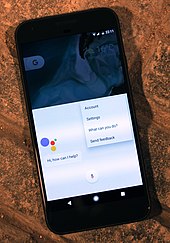
Back Assistent personal intel·ligent Catalan یاریدەدەری خەیاڵی CKB Virtuální asistent (umělá inteligence) Czech Intelligenter persönlicher Assistent German Asistente virtual Spanish Laguntzaile birtual Basque دستیار مجازی Persian Virtuaaliavustaja Finnish Assistant personnel intelligent French Asistente persoal intelixente Galician

A virtual assistant (VA) is a software agent that can perform a range of tasks or services for a user based on user input such as commands or questions, including verbal ones. Such technologies often incorporate chatbot capabilities to simulate human conversation, such as via online chat, to facilitate interaction with their users. The interaction may be via text, graphical interface, or voice - as some virtual assistants are able to interpret human speech and respond via synthesized voices.
In many cases, users can ask their virtual assistants questions, control home automation devices and media playback, and manage other basic tasks such as email, to-do lists, and calendars - all with verbal commands.[1] In recent years, prominent virtual assistants for direct consumer use have included Apple's Siri, Amazon Alexa, Google Assistant, and Samsung's Bixby.[2] Also, companies in various industries often incorporate some kind of virtual assistant technology into their customer service or support.[3]
Into the 2020s, the emergence of artificial intelligence based chatbots, such as ChatGPT, has brought increased capability and interest to the field of virtual assistant products and services.[4][5][6]
- ^ Hoy, Matthew B. (2018). "Alexa, Siri, Cortana, and More: An Introduction to Voice Assistants". Medical Reference Services Quarterly. 37 (1): 81–88. doi:10.1080/02763869.2018.1404391. PMID 29327988. S2CID 30809087.
- ^ "Siri vs Alexa vs Google Assistant vs Bixby: Which one reigns supreme?". Android Authority. 29 January 2024.
- ^ "The Magic of Virtual Assistants and Their Impact on Customer Service".
- ^ "The One Thing You Should Definitely be Using AI Chatbot for". 7 April 2023.
- ^ "A.I. Means everyone gets a 'white-collar' personal assistant, Bill Gates says".
- ^ "Chat GPT: What is it?". uca.edu. Retrieved 8 February 2024.